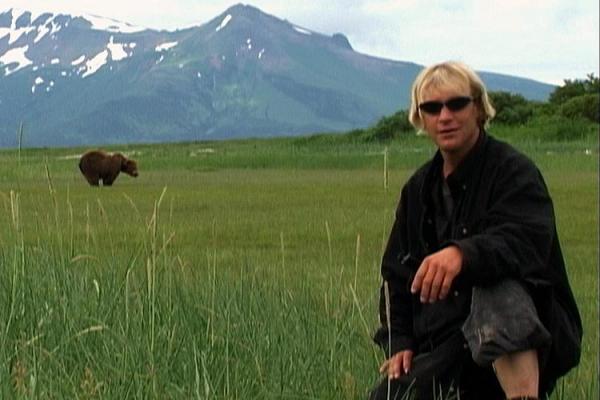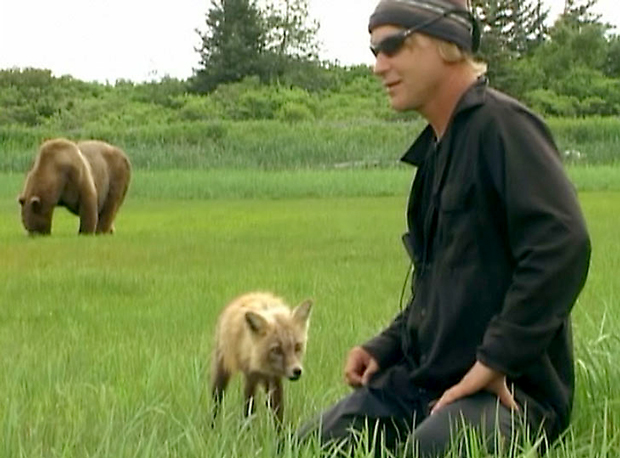Grizzly Man (2005)

Tireless German auteur Werner Herzog has to
date produced a multitude of documentary shorts and no less than 10
full-length documentary films, including My Best Fiend
(1999), an account of his tumultuous working relationship with actor
Klaus Kinski, and his most recent film Cave of Forgotten Dreams
(2010), a study of Neanderthal cave paintings in southern France.
By far his most well-known documentary work, however, is Grizzly Man,
which focuses on the last of controversial wildlife activist Timothy
Treadwell’s thirteen summers spent living amongst the grizzly bear
population of Katmai National Park in Alaska. Treadwell’s passion for
these creatures would eventually led to his demise - he and his
girlfriend Amie Hugeunard were killed and eaten by a bear while camping
in Katmui in 2003, and it is the viewer’s knowledge of this fact,
presented in the film’s opening sequence, that gives the work much of
its dramatic impetus.

Herzog seems to prefer not to imbue his
documentaries with an ideology as such. His main focus is rather more
often a singular, dominant or chronically unstable personality which he
proceeds to deconstruct subtlely and meticulously. This is certainly
the case with Grizzly Man, one of the more striking features of
which is its ability to arouse, like the inimitable Treadwell himself,
myriad reactions and a multitude of different questions in the mind of
the viewer. Was Treadwell an irresponsible nuisance or, as he put it, a
‘kind warrior’ fighting for his beloved grizzlies in the face of a
callous and uncaring world? Did he, as Herzog speculates, have an
unspoken death wish? Would his hours of footage have ever come to light
had he not been killed? And why did he feel so much more at home living
amongst animals such as foxes and bears than with his own kind?
One of the most noteworthy things about
Grizzly Man is the manner in which its director incorporates
various documentary techniques in order to masterfully manipulate his
viewer’s impression of the film’s central character. By introducing
carefully sequenced biographical data, interviews with friends and
acquaintances, still photographs and Treadwell’s own monologues, Herzog
gradually builds up a multifaceted and extremely complex whole.
Treadwell the eccentric conservationist quickly becomes Treadwell the
careless ontological tourist, a disenfranchised, failed actor rejected
by his own kind, a recovering alcoholic searching desperately for his
life’s purpose, an unstable and highly marginalised individual hiding
from his not inconsiderable demons in the wilds of Alaska.

Finally, upon the time film’s terrible
conclusion we are left with an impression of Treadwell as little more
than a delusional, if impassioned, adrenaline junkie, whose perpetual
and largely unjustified risk-taking resulted in the loss of not only his
own life but that of his partner. This end cannot come have wholly as a
surprise to Treadwell, who seemed to all but invite his own demise by
camping so late in the season amid an unfamiliar bear population. ‘Give
it to me, baby’ he goads one grizzly midway through the film, and during
the opening scene gleefully exclaims ‘I can smell death all over my
fingers.’ Herzog’s artistry lies in his extreme sensitivity to the
different Treadwell’s inhabiting the footage, and the manner in which he
gradually reveals these to his audience. Then again, he was well
qualified: ‘I have seen this madness before’ Herzog confides during one
late scene in which Treadwell’s sanity seems to dissipate entirely. With
Treadwell, as with Kinski, there is a pathological lack of self-control
and a fascination with extremes that likewise seems to have enraptured
Herzog, though his preferred vantage point is behind the all-seeing eye
of the camera as opposed to in front of it.
Artistry aside, however, one is left with a
sense of futility upon the film’s conclusion, not only for the loss of
two lives but for the nature of Treadwell’s work itself. The bears in
question are, after all, living amid the haven of a National Park, and
in no real need of a protection this self-styled environmental ‘samurai’
was neither qualified nor even able to provide. In one sequence he
‘confronts’ a group of duck hunters by hiding in the bushes muttering
until they pelt him with rocks, in another he interprets seemingly
innocuous graffiti as a veiled threat on his life. Midway through the
film it becomes apparent that the grizzlies don’t actually need
Treadwell at all, but the increasingly desperate Treadwell certainly
needs the bears, his passion for whom he credits with both giving his
life a meaning and curing him of the spectre of addiction.
For the most part Herzog abstains from
infusing his voiceovers with his personal judgement and opinions,
leaving his viewers free to draw their own conclusions. Like nature,
which he sees as wholly Darwinian and indifferent, his omnipotent
narration is dispassionate though not unkind. More often than not he
prefers to let Treadwell address the audience directly, though Herzog
does criticise Treadwell’s sentimentalised conception of nature and
steps in front of the camera on several pivotal occasions, as when he
listens to an audio recording of the conservationist’s final moments in
the presence of Treadwell’s tearful ex-girlfriend. The sense of pathos
engendered is unforgettable, and once more Herzog takes full advantage
of the versatility of the documentary form, simultaneously depicting
himself not only as narrator and director, but as a central character
within the structure of the film itself. It’s a powerful moment in a
moving and unforgettable work, and one of many thought-provoking images
contained therein that continues to resonate long after the film’s
conclusion.
Video
Treadwell’s amateur footage holds up
extremely well. It’s occasionally a little soft, the odd ant crawls
across the lens, but mostly he shows a rare eye for shot composition and
his filmic abilities are even complimented by Herzog at one point.
Treadwell’s shots are superbly augmented by Herzog’s own lush
cinematography, with the director’s usual obsessive emphasis on
landscape finding its culmination in some beautiful sequences of the
untamed Alaskan wilderness. The 16:9 anamorphic widescreen presentation
is for the most part pristine, especially considering the often
unorthodox nature of the source material – Madman don’t fuck about with
the picture quality on their Director’s Suite releases, and they weren’t
about to start here.
Audio
The two-channel audio is strong, the
extensive interviews always perfectly audible and Herzog’s own
heavily-accented ‘meta-narration’ likewise nice and clear.
Extras
Grizzly Man combines elements
of both control and unpredictability, particularly in Treadwell’s mock-vérité
wildlife segments; designed to look impromptu they were in fact
painstakingly rehearsed and reshot up to several dozen times apiece.
Herzog both tempered this emphasis on repetition and mirrored the
unpredictability of his subject’s personality by insisting on an
entirely improvised score, another oddity for the documentary genre. By
discarding the usual documentary practise of incidental ‘wall to wall’
music in favour of a deeply emotive score which emphasises mood, action
and dialogue, Herzog incorporated a traditional narrative film technique
into the documentary form, finding yet another way to subvert and extend
the boundaries of the medium.
Herzog’s painstaking and novel approach to
the music within the film is documented in the disc’s principal bonus
feature, a 54-minute featurette on the scoring of the soundtrack which
contains lengthy interviews with Herzog and his musicians, footage of
the recording sessions and extensive insights into the creative process
itself. Herzog controls every aspect of the recordings (at one point he
good naturedly informs a guitarist that ‘if you go too wild I’ll trample
on your foot’), but he wrings some beautiful performances from his
musicians and it’s a pleasure to watch him work at actualising the
perfect musical accompaniment he so clearly visualises. Also included
are a theatrical trailer and several Director’s Suite trailers.
Summary
Grizzly Man is such a deeply
impressive, multifaceted and fully-realised work that words can’t really
do it justice. In addition to being one of the high-water marks of
Herzog’s entire canon it’s one of the most sublime examples of the
documentary genre ever to grace the screen, and a work that
simultaneously challenges, edifies and entertains in equal measure.
It’s a film of rare power and remains, along with 1979s Nosferatu,
the most potent encapsulation of Herzog’s oft-avowed directorial goal of
the search for ‘aesthetic ecstasy and truth.’